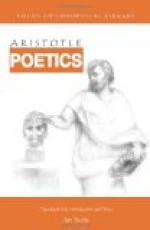Now as tragic imitation implies persons acting, it necessarily follows, in the first place, that Spectacular equipment will be a part of Tragedy. Next, Song and Diction, for these are the medium of imitation. By ‘Diction’ I mean the mere metrical arrangement of the words: as for ‘Song,’ it is a term whose sense every one understands.
Again, Tragedy is the imitation of an action; and an action implies personal agents, who necessarily possess certain distinctive qualities both of character and thought; for it is by these that we qualify actions themselves, and these—thought and character—are the two natural causes from which actions spring, and on actions again all success or failure depends. Hence, the Plot is the imitation of the action: for by plot I here mean the arrangement of the incidents. By Character I mean that in virtue of which we ascribe certain qualities to the agents. Thought is required wherever a statement is proved, or, it may be, a general truth enunciated. Every Tragedy, therefore, must have six parts, which parts determine its quality—namely, Plot, Character, Diction, Thought, Spectacle, Song. Two of the parts constitute the medium of imitation, one the manner, and three the objects of imitation. And these complete the list. These elements have been employed, we may say, by the poets to a man; in fact, every play contains Spectacular elements as well as Character, Plot, Diction, Song, and Thought.
But most important of all is the structure of the incidents. For Tragedy is an imitation, not of men, but of an action and of life, and life consists in action, and its end is a mode of action, not a quality. Now character determines men’s qualities, but it is by their actions that they are happy or the reverse. Dramatic action, therefore, is not with a view to the representation of character: character comes in as subsidiary to the actions. Hence the incidents and the plot are the end of a tragedy; and the end is the chief thing of all. Again, without action there cannot be a tragedy; there may be without character. The tragedies of most of our modern poets fail in the rendering of character; and of poets in general this is often true. It is the same in painting; and here lies the difference between Zeuxis and Polygnotus. Polygnotus delineates character well: the style of Zeuxis is devoid of ethical quality. Again, if you string together a set of speeches expressive of character, and well finished in point of diction and thought, you will not produce the essential tragic effect nearly so well as with a play which, however deficient in these respects, yet has a plot and artistically constructed incidents. Besides which, the most powerful elements of emotional: interest in Tragedy Peripeteia or Reversal of the Situation, and Recognition scenes—are parts of the plot. A further proof is, that novices in the art attain to finish: of diction and precision of portraiture before they can construct the plot. It is the same with almost all the early poets.




